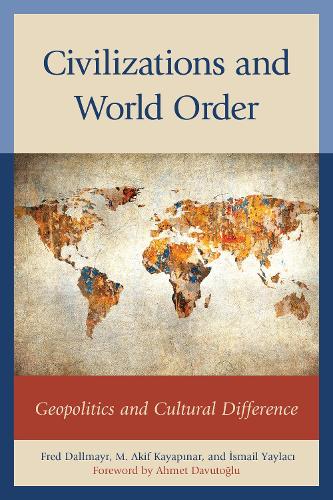
Civilizations and World Order: Geopolitics and Cultural Difference
(Hardback)
Available Formats
Publishing Details
Civilizations and World Order: Geopolitics and Cultural Difference
By (Author) Fred Dallmayr
Edited by M. Akif Kayapinar
Edited by Ismail Yaylaci
Foreword by Ahmet Davutoglu
Contributions by Cemil Aydin
Contributions by Chris Brown
Contributions by igdem idam
Contributions by Ahmet Davutoglu
Contributions by Raymond Duvall
Contributions by Richard A. Falk
Bloomsbury Publishing PLC
Lexington Books
24th September 2014
United States
Classifications
Professional and Scholarly
Non Fiction
Globalization
327.101
Physical Properties
Hardback
276
Width 163mm, Height 233mm, Spine 24mm
535g
Description
Civilizations and World Order: Geopolitics and Cultural Difference examines the role of civilizations in the context of the existing and possible world order(s) from a cross-cultural and inter-disciplinary perspective. Contributions seek to clarify the meaning of such complex and contested notions as civilization, order, and world order; they do so by taking into account political, economic, cultural, and philosophical dimensions of social life. The book deals with its main theme from three angles or vectors: first, the geopolitical or power-political context of civilizations; secondly, the different roles of civilizations or cultures against the backdrop of post-coloniality and Orientalism; and thirdly, the importance of ideological and regional differences as factors supporting or obstructing world order(s). All in all, the different contributions demonstrate the impact of competing civilizational trajectories on the functioning or malfunctioning of contemporary world order.
Reviews
Every so often a book comes our way which challenges us to thinkoutsidethe box. This rich collection of essays does just that. Each author, while reflecting his own distinctivephilosophicaland culturalstandpoint, addresses two questions which go to the heart of our current predicament. Given the steady decline of Western political and cultural hegemony side by side with accelerating globalization, what are the prospects of constructing a relatively peaceful world order Is civilizational difference part of the problem or part of the solution The answers are diverse, often provocative, and invariably insightful. -- Joseph A. Camilleri, La Trobe University
These chapters provide a single powerful message: to understand each other is often difficult and demanding, but it is by far the most profitable strategy for international politics. And it is ultimately intellectually rewarding. -- Daniele Archibugi, University of London
Author Bio
Fred Dallmayr is Packey J. Dee Professor Emeritus in philosophy and political science at the University of Notre Dame. Akif Kayapinar is assistant professor of political science and international relations at Istanbul Sehir University. Ismail Yaylaci is a doctoral candidate in political science at the University of Minnesota, Twin Cities.
